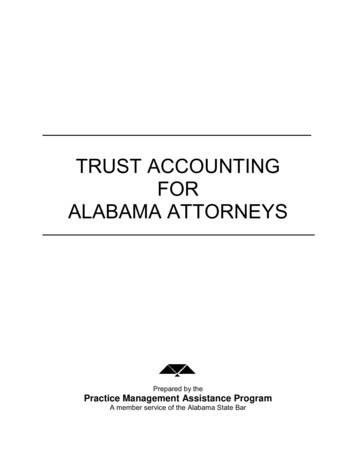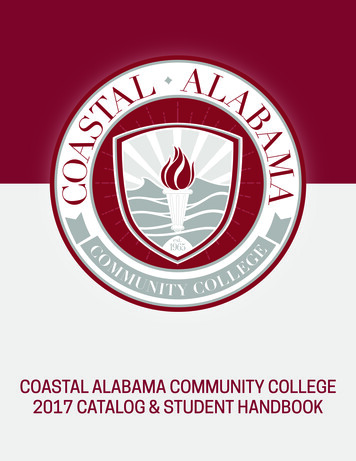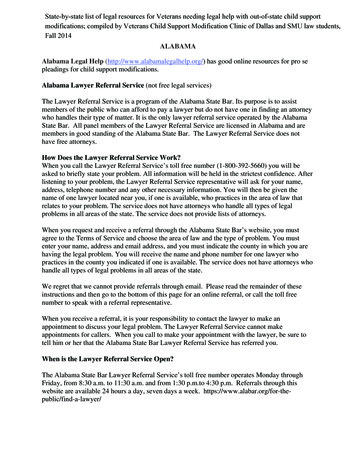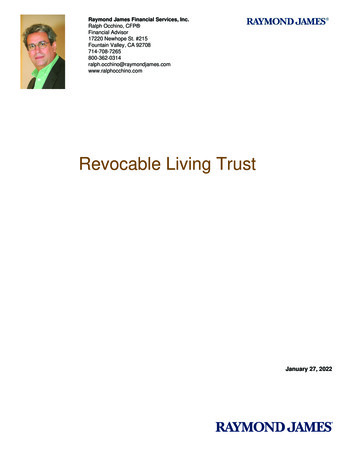
Transcription
TRUST ACCOUNTINGFORALABAMA ATTORNEYSPrepared by thePractice Management Assistance ProgramA member service of the Alabama State Bar
ii
PrefaceThis work is a general overview designed to answer commonly asked questions.It is not exhaustive and it does not attempt to cover every situation or every questionrelated to attorneys’ trust accounts in Alabama. Originally prepared in 1997, it is basedon Trust Accounting for Attorneys in Georgia which was written by Terri Olson duringher term as Director of the Law Practice Management Program of the State Bar ofGeorgia. We are grateful for her help and for the State Bar of Georgia’s permission tocreate our own handbook based on the design of theirs.Rule 1.15 of the Alabama Rules of Professional Conduct, pertaining tosafekeeping client property, and selected ethics opinions are included to provide furtherguidance. If, after reading this material, you still have questions about the propriety ofcertain actions, please contact the Office of the General Counsel at (334) 269-1515 or(800) 354-6154 (instate only) for a free, confidential, informal opinion.If you have questions regarding the mechanics of trust account setup orbookkeeping, please contact the Practice Management Assistance Program at (334)269-1515 or (800) 354-6154 (instate only).If you have any questions regarding the Alabama Law Foundation, pleasecontact Tracy Daniel at (334) 387-1600. Questions regarding the Alabama Civil JusticeFoundation should be directed to Sue McInnish at (334) 263-3003.Laura A. Calloway, DirectorPractice Management Assistance ProgramRevised September 2016iii
iv
TABLE OF CONTENTSAbout Trust Accounts . 1Setting Up a Trust Account . 7Receiving and Disbursing from the Account. 11Maintaining Trust Account Records. 13Text of Supreme Court Order and Revised A.R.Pro.C. 1.15. 17Selected Ethics Opinions . 35Notice to Financial Institution to Establish an IOLTA Account . 45Supplement to Deposit Agreement . 46Sample Trust Account Ledgers . 47IRS Form 8300 - Report of Cash Payments Over 10,000 . 49v
vi
ABOUT TRUST ACCOUNTSWhat is a trust account and what types of funds are placed in one?A trust account is a separate bank account set up to hold any money you receiveon behalf of a client or a third party in a legal matter. Examples of funds to be placed ina trust account include earnest money deposits or down payments for loan closings,settlement proceeds or damage awards that have not yet been divided betweenyourself and your client and distributed in personal injury or other tort cases, advancepayments for fees that you have not yet earned (sometimes mistakenly called“retainers”), and deposits to cover expenses in a case.Attorneys in Alabamasometimes use the terms “attorney’s trust account” and “attorney’s escrow account”interchangeably, but “trust” account is preferred because “escrow” has a specificmeaning related to real estate practice and its use may cause the account to beconfused with the accounts that can legally be set up by real estate agents and otherprofessionals.Why do I have to have a trust account if I seldom hold client funds?Rule 1.15(a) of the Alabama Rules of Professional Conduct requires that alawyer must hold property of clients or third persons that is in a lawyer’s possession inconnection with a legal matter completely separate from the lawyer’s own property.All lawyers, except those not engaged in active practice pursuant to §34-3-17 and §343-18, Code of Alabama, 1975, as amended, must maintain a separate account to holdthe funds of clients pursuant to Rule 1.15(j). Under Rule 1.15(j), the only lawyersadmitted to practice in Alabama who do not have to maintain a trust account are thosewho do not have an office within the state; do not ever hold funds of clients or thirdparties; are not engaged in the active practice of law; are judges, attorneys-general,public defenders, U.S. attorneys, district attorneys, on duty with the armed services orare employed by a local, state or federal government entity and are not otherwiseengaged in the practice of law; or are corporate or in-house counsel or are lawprofessors and are not otherwise engaged in the active practice of law.Does the account have to be an IOLTA account?Yes. All Alabama lawyers are required to hold client or third party funds that areeither nominal or are to be held for only a short period of time in one or moreIOLTA accounts. The requirement to have an IOLTA account has been mandatory inAlabama since 2008. Your IOLTA account should be used only for amounts that arenominal or sums that are expected to be held for a short period of time. Funds that arenot nominal or are expected to be held for long periods of time will be discussed below.1
What is an IOLTA account, and where do I get one?“IOLTA” means Interest on Lawyers’ Trust Accounts. An IOLTA account is apooled interest- or dividend-bearing account set up specifically to hold all trust fundsyou receive that are nominal in amount or that are expected to be held for only ashort time. The interest that accrues on this account is remitted automatically by yourfinancial institution to the Alabama Law Foundation (ALF) or the Alabama Civil JusticeFoundation (ACJF) to be awarded by them in the form of grants. You may select whichfoundation receives the interest from your account.The account must be maintained in an “eligible institution.” This is defined byRule 1.15 as a bank or savings and loan association whose deposits are insured by anagency of the federal government, or any open-end investment company which isregistered with the Securities and Exchange Commission. The institution you selectmust be authorized by federal or state law to do business in Alabama.The IOLTA program has been in effect in Alabama since 1987, when voluntaryuse of such accounts first became available, and most financial institutions are familiarwith it and will be happy to assist you in establishing such an account. Financialinstitutions which meet the requirements to offer IOLTA accounts are certified yearly. Ifyour bank does not offer IOLTA accounts, call Tracy Daniel at the Alabama LawFoundation (334-387-1600) or visit www.alabamalawfoundation.com for the name of abank in your area which does.How will anyone know if I don’t comply?Rule 1.15 (j) requires that “Every lawyer admitted to practice in this State shallannually certify to the Secretary of the Alabama State Bar that all IOLTA eligible fundsare held in an IOLTA Account, or that the lawyer is exempt ” for the reasons stated inthe rule. At the beginning of September you will receive an email reminding you thatoccupational licenses may be purchased and special membership dues may be paidimmediately and are delinquent after October 31st. The email will also instruct you tolog in to the Alabama Law Foundation’s website (www.alabamalawfoundation.org) andeither certify that you have an IOLTA trust account number or that you are exempt frommaintaining a trust account. You will have until October 31st to complete this process.Lawyers who do not do so will receive a communication from either the Alabama LawFoundation or the Office of General Counsel giving them additional time within which tocomplete the certification process, after which any non-compliant lawyers will bediscipline. Failure to certify can result in suspension of your license to practicelaw and additional penalties.What are the requirements for an IOLTA account?Under Rule 1.15(k) of the Alabama Rules of Professional Conduct, IOLTAaccounts must meet the following requirements:2
Financial institutions must pay on IOLTA accounts the highest interest rate ordividend the financial institution offers to its non-IOLTA customers when the IOLTAaccount meets or exceeds the same minimum balance or other eligibility requirements.Interest or dividends for IOLTA accounts must be calculated in the same way as fornon-IOLTA accounts. The rule has some methods for determining how the variousaccounts an institution offers should be compared to IOLTA accounts and whether thehighest rate of interest is being paid to IOLTA accounts, but you don’t have to worryabout these calculations. Under the rule, financial institutions which offer IOLTAaccounts must file a report, showing the interest or dividend rate paid on both IOLTAand other accounts offered, with the Alabama Law Foundation and Alabama CivilJustice Foundation. The foundations will then certify to the Alabama Supreme Court theparticipating financial institutions’ compliance with the rule on an annual basis.Only “allowable reasonable fees” may be deducted from the interest earned byIOLTA accounts. Reasonable fees are defined by Rule 1.15 as: (1) per check charges;(2) per deposit charges; (3) a fee in lieu of minimum balance; (4) Federal depositinsurance fees; (5) sweep fees; and (6) a reasonable IOLTA account administrative fee.No other fees may be deducted from the interest. All other fees which the depositoryinstitution charges are the responsibility of the lawyer or law firm maintaining theaccount.The depository institution must agree that it will remit interest, less reasonablefees charged against the interest accrued by the account, at least quarterly to ALF orACJF. It must also transmit with each remittance a statement reflecting the period oftime covered by the remittance, the name in which the account is maintained, theaccount number, the interest rate, the gross amount of interest or dividend earnedduring the period, the amount and description of any service charges or fees assessed,the average account balance for the remittance period, and the net amount of interestremitted, with a copy to the lawyer.What do ALF and ACJF do with the interest earned?All interest transmitted to and received by ALF must be distributed by it for one ormore of the following purposes: (1) to provide legal aid to the poor; (2) to provide lawstudent loans; (3) to provide for the administration of justice; (4) to provide law-relatededucational programs to the public; (5) to help maintain public law libraries; (6) forsuch other programs for the benefit of the public as are specifically approved by theSupreme Court of the State of Alabama from time to time. ALF was created by theAlabama State Bar and is administered by the Alabama Law Foundation.All interest transmitted to and received by ACJF must be distributed by it for oneor more of the following purposes: (1) to provide financial assistance to organizations orgroups providing aid or assistance to: (a) underprivileged children; (b) traumaticallyinjured children or adults; (c) the needy; (d) handicapped children or adults; (e) drugand alcohol rehabilitation programs; and (2) for such other programs for the benefit ofthe public as are specifically approved by the Supreme Court of the State of Alabama3
from time to time. ACJF was created and is administered by the Alabama Associationfor Justice.Who defines “nominal” and “short term?”You do, based on the criteria set forth in Rule 1.15(k). In situations where youwill be holding a substantial sum of money for a period of several months or more,depending on prevailing interest rates, it might be in the client’s best interest for you toopen a separate interest-bearing account for that client alone.The standard is whether the interest which could be earned for the client willexceed the costs incurred to secure that income. To determine this, you must consider:(1) the amount of interest or dividends likely to be earned; (2) the estimated cost ofestablishing and administering a non-IOLTA account for the individual client, includingthe cost of your services and the cost of preparing any tax reports required; (3) theability of the financial institutions, lawyers or law firms involved to calculate and payinterest to individual clients or third parties; and (4) any other circumstances whichwould affect the ability of the client or third person’s funds to earn income in excess ofthe costs required to earn it. You must review your IOLTA account at reasonableintervals to determine whether changed circumstances require further action withrespect to the funds of any client or third party.What if I decide the client would benefit from a separate trust account?In that case, you would generally set up an interest bearing account for thebenefit of that client alone, using the client’s tax identification number and remitting theinterest to the client. When opening an individual trust account for a client, if you doplace money in anything other than a deposit account, be sure that the money is safe(don’t place trust funds in high risk investments, no matter what your client suggests oragrees to) and accessible (don’t place trust funds in an account or other investment inwhich they are non-liquid or penalties for early withdrawal are charged).What if I make a mistake regarding whether to open a separate account?Don’t worry. Rule 1.15(k) states that this determination “ shall rest in thesound judgment of the lawyer or law firm, and no lawyer shall be charged with an ethicalimpropriety or breach of professional conduct based on the good-faith exercise of suchjudgment.”What if I just don’t want to maintain an IOLTA account?Unfortunately, you have no choice. With the amendment to rule 1.15 whichbecame effective on January 1, 2008, Alabama is the 35th state in which IOLTAaccounts are mandatory.4
Can I ever place my own funds in my trust account?Yes, but the rule lists only two instances in which this is permissible. Oneinvolves funds to pay bank service charges or “to obtain a waiver thereof.” There usedto be a tacit understanding that a lawyer could place a minimum amount in the accountto keep it from going to a zero balance if all client funds were withdrawn and to pay oravoid service charges, even though the rule did not explicitly say so. With the 2008amendment to Rule 1.15, this is now official.The other exception involves unearned attorney’s fees. A lawyer must place inthe trust account funds which represent unearned fees. This includes advances againsthourly fees and flat fees which have not yet been earned in full, and amounts in whichboth the lawyer and a client or third party claim an interest before division. Exampleswould be funds payable to the client in settlement of a case or satisfaction of ajudgment, from which the attorney will also receive payment for his or her services.Such sums must be kept separate from the lawyer’s own funds until there is anaccounting and a severance of the lawyer and the client’s interests. If a dispute arisesconcerning the respective interests, the amount in dispute must be kept separate untilthe dispute is resolved.What about property that isn’t money?Under Rule 1.15(a) of the Alabama Rules of Professional Conduct, you mustsafeguard all property in your possession belonging to your clients or to third parties,not just money. Non-monetary property of a client must be identified as belonging tothe client and appropriately protected. The Rule does not specify methods ofsafekeeping property other than money, but the method used must be reasonable inlight of the type of property held and its value to the client or third party. The intrinsicvalue of an item may be small, but its value in the context of the case may besubstantial. If you do not have a safe or locking fire-proof file cabinet in your office, youmay wish to rent a safe deposit box for such items. If you set up a safe deposit box tohold client property, make sure that it is properly labeled so that the bank will realizethat the contents are not your personal property or that of your firm. As with money, youshould not store items belonging to clients or third parties with items of your own. If youare a sole practitioner, make sure that, in the event something should happen to you,another lawyer acting on your behalf can obtain access to the box without undue delay.What are my record-keeping requirements?You are required to keep good, accurate records of all property you receive onbehalf of clients or third parties. This means your trust accounts must always be inbalance, and you must have a good method of keeping up with other property whichyou receive from, and return to, clients or third parties. You should obtain a receipt froma client or third party every time you return physical property of any type.5
You are required to keep trust account and other property records for a minimumof six (6) years after termination of the representation, and you must produce them ifrequested to do so by the Office of General Counsel. Failure to do so constitutesgrounds for an investigation of yourself and your trust accounting practices,independent of any other grounds for the same that may exist. See MAINTAININGTRUST ACCOUNT RECORDS below for information on the specific records which mustbe created and retained.6
SETTING UP A TRUST ACCOUNTHow do I set up a trust account?You will need to go to an institution that offers IOLTA accounts. Mostcommercial banks and many credit unions in Alabama now offer these accounts A list ofall Alabama financial institutions which offer IOLTA accounts can be found on theAlabama Law Foundation’s web site le-banks/.It’s usually a good idea to go to a main office and not to a small branch to set upyour account, although you can still do your everyday banking at the branch. In thelarger banking centers you are more likely to find an account representative who isfamiliar with attorney’s trust accounts. Make sure you understand the bank’s policy fordealing with service charges which do not fall within the “allowable reasonable fees”defined by Rule 1.15 of the Alabama Rules of Professional Conduct. Call several banksand ask about service charges on their IOLTA accounts before you select one and go into open the account.If you are setting up an IOLTA account, you may need to provide the bank withthe correct tax identification number. You can obtain the correct tax identificationnumber for the Alabama Law Foundation or the Alabama Civil Justice Foundation fromthe respective foundation, or request the bank to do so. Most banks which offer IOLTAaccounts have the necessary account agreement forms which contain all of the requiredprovisions and information. If your bank does not have one of these forms, you can getone by calling ALF or ACJF or by going to their respective websites atwww.alabamalawfoundation.org org or www.acjf.org. Contact information for eachfoundation is listed in the Preface to this handbook, on page iii.If you are setting up a non-IOLTA account for a particular client, you will need touse the client’s tax identification number. Do not use your firm’s tax identificationnumber. This will result in the interest being reported as having been paid to andearned by you or your firm, and you will be taxed accordingly.Under Rule 1.15(a) you must include the words “Attorney Trust Account,”“Attorney Escrow Account” or “Attorney Fiduciary Account” somewhere in the title of theaccount and on all checks and deposit slips for the account. We prefer “Trust Account”and suggest something along the lines of:Black, White & Green, P.C.Attorneys at LawIOLTA Trust Account7
If the account is an individual client trust account, use something like:Black, White & Green, P.C.Attorney Trust Account for John Q. ClientYou should check your first statement to make sure that the IOLTA account hasbeen set up properly and that the correct tax identification number is on the account,especially if you have several accounts with the same bank. (Be sure to make a note ofthe tax identification number because you may need to give it to the bank’s customerservice representative or enter it in an automated system before seeking informationabout the account over the phone or online.)The words “Business Account,” “Professional Account,” “General Account,”“Payroll Account,” “Regular Account” or other appropriately descriptive words must alsobe used in the titles for all such accounts you or your firm open, and all the documentsassociated with them.Should I have all my bank accounts (operating and trust) at the same bank?There are several factors to consider. If you are a real estate attorney and do alot of closings on behalf of a bank or bank-associated mortgage company, it may wantyou to place your account there for convenience. (This can result in your having morethan one IOLTA account – which is OK.) You may also have a banking relationship oflong standing with a particular bank and wish to keep your account there. There are,however, some practical reasons to have your accounts distributed among severalbanks.The most important reason is the possibility of error. With multiple accounts atone bank, you or your staff may mix up deposit slips or mistake the checkbook for oneaccount with that of the other. Likewise, the bank may occasionally confuse theaccounts. Many banks have a policy of automatically transferring funds from anyaccount with your name on it to cover shortages in another. If you accidentallyoverdraw your operating account, the bank may attempt to “help” you by transferringfunds from your trust account to cover the overdraft. No matter how careful you or yourfinancial institution are, mistakes can happen.Does FDIC insurance cover all funds in my trust account?Not anymore.This is an issue that most lawyers never even thought about until the financialcrash of 2008, when banks began to fail and be taken over by the FDIC. Becauseattorney trust accounts were subject to the then 100,000 FDIC insurance limit, if anattorney held funds in excess of 100,000 on behalf of a single client or third-party in aninsured institution which failed, it was possible that the excess amount might be anuninsured loss. While the question was never addressed, it is at least arguable that an8
attorney could be liable for uninsured losses from a trust account in the event of a bankfailure since he or she is absolutely responsible to protect trust funds.Under the provisions of the Dodd-Frank Wall Street Reform and ConsumerProtection Act, FDIC insurance provided unlimited coverage on “noninterest-bearingtransaction accounts through December 31, 2012. The Insurance Provision of the actincluded IOLTA accounts within the definition of noninterest-bearing transactionaccounts, provided that they met certain requirements – which Alabama IOLTAaccounts did. However, the legislation passed in January of 2013 to avoid the “fiscalcliff” did not extend this coverage past December 31, 2012. Consequently, individualclients or third parties are now only insured up to the 250,000 per depositor FDICinsurance limit. (In order to claim this pass-through coverage you must have accuraterecords regarding how much you hold in trust on behalf of each client or third-party.)Thus, if you hold more than 250,000 on behalf of an individual client in a trustaccount in a bank that fails, the excess will not be covered and you may, arguably, beresponsible for any loss. And since any funds the client has deposited in that bank willalso be counted against his or her insurance limit, it’s always a good idea to confer withthe client before making large trust deposits. Given the financial recovery, this is amore and more unlikely situation, but one you should at least be aware of.Who should sign on my trust account?Under Rule 1.15(f)(1), only a lawyer admitted to practice in Alabama or a personunder the lawyer’s direct supervision may sign trust checks or be authorized to makeother transfers from the account. Because of the responsibility you bear to safeguardyour client and third party funds (and the severe discipline you will face if those fundsare improperly removed from the account), it is usually best to have only your ownsignature if you are a solo practitioner. All firm members are ethically responsiblefor all funds held in trust, regardless of which client or third party the funds camefrom and which lawyer is responsible for the legal matter, so it’s wise to institutechecks and balances within a firm.Regardless of who signs the checks, always take the precaution of having alltrust account statements delivered to your desk unopened each month. Examine eachcheck for alterations before balancing the account. An employee or even a fellowlawyer who has the authority to sign checks should never be entrusted with theresponsibility of also balancing the account. With current office technology, such ascolor printers and copy machines, the opportunities for unnoticed alteration of checksand bank statements is tremendous. Don’t create opportunities for temptation, anddon’t take any chances!9
10
RECEIVING AND DISBURSING FROM THE ACCOUNTWhat are my obligations when I receive funds or other property for a client orthird party?When a lawyer receives funds or other property in which a client or third partyhas an interest, he or she must promptly notify the interested party. Except as theAlabama Rules of Professional Conduct or other rule or law allows, or as an agreementbetween the lawyer and the interested party provides, the lawyer must promptlydeliver to the client or third party any funds or property the other is entitled to. Promptdelivery will be determined in light of the totality of the lawyer’s circumstances at thetime of receipt of the property, such as a trial, but it’s best to put systems in place thatensure notification and delivery no matter what else is going on. If the other partyrequests it, the lawyer must also promptly render a full accounting of the money orproperty. NOTE: Rule 1.5 on contingent fees requires a written accounting, regardless.What if I receive funds on behalf of a client and I lose the money or my office isburglarized before I can deposit it?You are responsible from the moment you receive funds until you remit them tothe person to whom they are due. If you lose them, you will have to repay the loss.You should establish procedures to ensure that cash and checks are safeguarded whilein your office, and that funds are deposited promptly. Rule 1.15(f)(2) requires thatreceipts be deposited intact. This means that even if you are entitled to a portion of acash deposit, the funds must first be placed in the trust account and then paid out bycheck from the account. Records of deposit should be sufficiently detailed to identifyeach item on each deposit.How do I handle advance payments or retainers?You can, and should, move the money out of your trust account as soon as youhave earned it. Your client should be aware, from the signed fee agreement betweenthe two of you, that advance payments will be withdrawn and transferred as work isperformed. If this information is included in your fee agreement you don’t need to notifythe client and wait for permission each time you wish to make a withdrawal. Youshould, however, send the client a statement on a regular basis. The statement shouldindicate how much work has been done, how much money has been transferred out ofthe trust account and how much remains. As additional funds are needed, the client willbe prepared. Also, you will not have to worry about the client complaining at the end ofthe matter that he or she didn’t realize the case was going to take so much work or costso much.Can I make a trust disbursement as soon as I deposit funds in my account?You should investigate your bank’s rules on availability of funds. Generally,funds will not be immediately available for withdrawal. You must wait for the funds to11
clear the bank. The length of time it takes for a deposit to clear depends on manythings, such as what kind of deposit it is (personal check, cashier’s check, cash) and, ifa check, which bank it was drawn on (local, out of town, out of state, out of country).Attorneys sometimes feel that it doesn’t matter whether a particular deposit hasbeen collected by their bank, as long as there are sufficient funds in the trust account tocover the check being written. You must realize, however, that when you write a checkagainst uncollected funds of one client you are, essentially, “borrowing” from thecollected funds of other clients in order to pay that check. You are at risk if theuncollected item is returned for insufficient funds or payment is stopped.Rule 1.15(d) of the Alabama Rules of Professional Conduct states that a lawyershall not make disbursements of a client’s funds from an account containing the fundsof other clients unless the funds are collected. The exception is that you maydisburse uncollected funds at your own risk if you have a reasonable and prudentbelief that a deposit will be collected promptly. If collection does not occur you mustreplace the funds yourself within five (5) days of notice of non-collection. This meansthat you will bear the risk of any returned checks if you do not wait to be sure they havecleared before you disburse. When dealing with all but the smallest sums, it’s better tobe safe than sorry.This rule poses particular problems for real estate closing attorneys. The sumsinvolved in land transactions are often substantial and, in many cases, you don’t knowhow much the purchaser needs to bring until a short time before the closing. It i
Rule 1.15(a) of the Alabama Rules of Professional Conduct requires that a lawyer must hold property of clients or third persons that is in a lawyer's possession in connection with a legal matter completely separate from the lawyer's own property. All lawyers, except those not engaged in active practice pursuant to §3417 and §34-3- -











